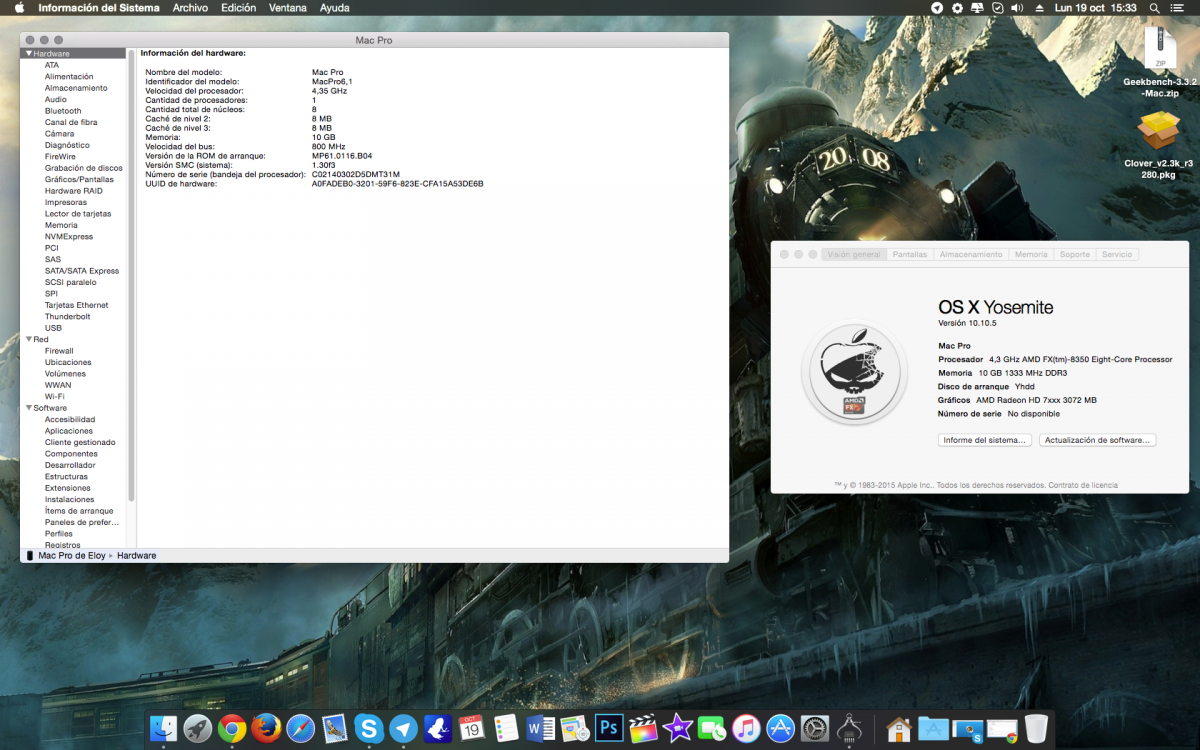- Download Hackintosh El Capitan
- Hackintosh Zone El Capitan
- Mac Os X El Capitan Hackintosh
- Mac Os El Capitan Dmg Hackintosh
WARNING: If you have updated boot.efi on a MacPro1,1 or MacPro2,1 so you can run Mac OS X 10.11 El Capitan, DO NOT INSTALL SECURITY UPDATE 2018-001. According to Greg Hrutkay of Hrutkay Mods (see warning video), it breaks boot.efi on the 2006 and 2007 Mac Pros that have been thus updated.
El Capitan's name is the largest rock in Yosemite National Park. Yosemite is a newer version of OS X that is intended to refine and develop Yosemite and is called EL Capitan. This version is called Yosemite, so it happens to both OS X Leopard and OS X Snow Leopard and OS OS Mountain Lion. We need to prepare a USB thumb drive that will contain the installation files as well as the bootloader and custom kexts for our specific Hackintosh build. Download El Capitan from the Mac App Store. Head over to your existing OS X environment running 10.9 or later and open the Mac App Store. Search for 'El Capitan' and click Download. The download is completely free if you're running OS X 10.9+.
With OS X 10.11 El Capitan, Apple continues its annual march to newer, better, more powerful versions of Mac OS X. Best of all, El Capitan runs on the same Macs that support OS X 10.8 Mountain Lion, 10.9 Mavericks, or 10.10 Yosemite.
Let’s take a look at what’s new!
More Speed
Apple claims El Capitan does nearly everything faster than earlier versions of OS X, with apps launching up to 40% faster, app switching twice as fast, and Preview displaying a PDF four times as fast.
On the gaming front, there’s Metal, a core graphics technology that gives programmers better access to a graphics card’s capabilities. Apple claims draw calls are up to 10x faster than in Yosemite, and also that web pages will render 40% faster.

Ars Technica has compared Metal with OpenGL and found decidedly mixed results that are very dependent on your graphics hardware. Each renders some things better than the other.
Split View
Ever since System 7, Macs have been able to run more than one program at a time. And even on the itty bitty 9″ 512 x 342 pixel displays of those compact early Macs, it was possible to view open windows from two or more apps at the same time. But it was up to you to arrange those windows.
With Split View, OS X finally gets a feature that’s been available through third-party apps for years: Automatically splitting the window to display two apps side-by-side on today’s much larger displays. (iOS 9 brings the same capability to iPads.)
As someone who is almost always working with two or more apps, this could become a very useful feature. Unfortunately, my only Mac capable of running El Capitan is a 13″ Late 2008 Aluminum MacBook, and its 1280 x 800 display already feels cramped. But with an external display, things will be much better.
Find Your Cursor
The bigger the display, the harder it can be to find your cursor. With El Capitan, jiggle your finger on the trackpad or jiggle your mouse, and it gets bigger – and easier to find.
Apple has been tinkering with Mail forever, sometimes ruining the app, sometimes bringing back ease-of-use lost over the “upgrade” cycle. Word on the street is that Mail in El Capitan finally gets things right again. I can’t say; I don’t use it.
I gave up on the OS X Mail app years ago. I’ve been using Postbox for a while now, and I love it. Postbox is a commercial email client based on Mozilla Thunderbird. I’m more than happy to use an email program that works consistently on my various Macs, although I have not yet upgraded from version 3. Version 4 still supports OS X 10.6 Snow Leopard and later on Macs capable of running 64-bit software.
Notes
If you haven’t already discovered Evernote, you might find the updated Notes app a big step forward. It finally lets you edit notes and sync them between OS X and iOS devices.
Or you can use the free Evernote app, which is available for OS X, iOS, Android, and Windows. If you need more space than for base membership supports, you can upgrade to Evernote Plus or Evernote Premium for a fee. The free version works for me.
Then again, Notes is a completely new app now. It can handle PDFs, photos, web links, map locations, create checklists, and much more, and it will sync them between OS X El Capitan and iOS 9 devices – only.
Mission Control
Apple has updated Mission Control, which has been part of OS X since 10.8 Mountain Lion. Mission Control makes it easy to find an application window by displaying thumbnails of all open windows on your display and letting you click on the one you want.
Mission Control is a feature I will admit to never having used.
Spotlight

Spotlight has been around since OS X 10.4 Tiger, and El Capitan takes it to the next level. Where Spotlight started out as a way to collect information on any file on your hard drive(s), it now goes beyond your Mac. You can do natural language searches – and search sources on the Internet.
I’ve never found Spotlight very useful. I almost always search by file name, so all those extra search capabilities in Spotlight are lost on me.

Download Hackintosh El Capitan
Live Photos
Apple’s new Live Photos image format is a cross between the traditional still photo and a video. When you use Live Photo for your shots, your iPhone 6S or 6S Plus records 1.5 seconds before and after you touch the shutter button, sound included. Only the iPhone 6 and 6S support Live Photos – plus any Mac capable of running OS X 10.11 El Capitan and it Photos app.
Here’s hoping Apple supports image editing for Live Photos – it’s a sure thing no existing app supports them yet. Facebook plans to support Live Photos on its iOS app by the end of the year.
Safari
Hackintosh Zone El Capitan
Yeah, yeah, another iteration of Apple’s own web browser. You can now pin your favorite sites and turn off the volume in a tab without having to open it.
Maps
Probably not as big a deal on your Mac as on an iPhone or iPad, OS X Maps is keeping up with features on the iOS versions, including mass transit. And if your iDevice is running iOS 9, you can send your route to it.
San Francisco: Putting a New (Type) Face on OS X
One distinctive thing that immediately set the Macintosh apart from other personal computers was its use of fonts, including the system font used for the menu bar and pull-down menus. In the earliest versions of the Mac OS and up to Mac OS 7.6, the system font was Chicago.
With the introduction of Mac OS 8 and its Platinum interface, Charcoal was introduced as the new system font. It’s not very different from Chicago, and we’ve been using it on our header graphic for years.
Apple made a lot of changes with the introduction of Mac OS X, and using Lucida Grande as the system font was one of them. Lucida Grande remained the system font through OS X 10.9 Mavericks.
With OS X 10.10 Yosemite, Apple moved to Helvetica Neue as its system font, the same typeface use on iPhones and iPads starting with iOS 7. And now it’s changed the system font once again, adopting the San Francisco font developed for Apple Watch.
Other Fonts
Mac Os X El Capitan Hackintosh
In addition to San Francisco, Apple has a new Chinese font, PingFang, “with thousands of redesigned characters and six new line weights”, as well as four new Japanese fonts. Apple has also improved trackpad input for Chinese.
Keywords: #osxelcapitan #elcapitan
Short link: http://goo.gl/up7xF3
searchword: osxelcapitan